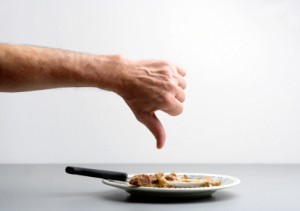 We’ve all committed at least one. Or maybe two (or five). When it comes to dieting, there are as many “rules” as there are diet books, diet pills and diet gadgets.
We’ve all committed at least one. Or maybe two (or five). When it comes to dieting, there are as many “rules” as there are diet books, diet pills and diet gadgets.
But there are a few, seven to be exact, deadly sins of dieting. The list is not meant for you to twist another thorn in your crown or take a swat at your self-esteem, but rather to help us all take a thoughtful look at the unproven things we tell ourselves and do all in the name of health and thinness.
Before you read the seven deadly sins of dieting, resolve to chuckle at yourself when you come across something you ascribe to. And most importantly, commit to living a healthy life today, one that is free of thoughts and behaviors that keep you shackled to the crazy world of diets.
1. Eliminating specific types of food – Whether you decide to nix sugar, banana nut muffins, egg yolks, dairy, soda or corn on the cob from your diet, you’re setting yourself up for a rebound effect where you’ll most likely spend a good chunk of time chowing down on the aforementioned forbidden food. Now, giving up sugary soda or white flour, clearly has its merits since these foods lack nutritional value, but saying no to one specific kind of food for the rest of your life is not realistic. Chances are that giving up something that you frequently eat, might very well result in weight loss. But your best bet is to be practical and health-savvy and leave the perfectionist attitude towards food to someone else.
2. Not being honest with yourself – There is one reason why alcoholics and drug addicts rely on a sponsor for keeping them in line: accountability. This is not to say you need to go check yourself into a dieting support group, but being honest with yourself and with others about what you eat, and most importantly, why you are eating is integral to establishing a healthy relationship with food.
3. Starvation – You will get thin from subsisting on 450 calories or less per day. But you will also create a maelstrom of health problems for yourself, including physical, emotional and mental setbacks. Be good to yourself: Don’t let your daily intake dip below 1,200 calories.
4. Wasting money – The diet industry is a multi-billion dollar market that convinces millions of Americans that if they buy their product, their weight loss dreams will come true. But from diet pills to waist-whittling belts that vibrate, you are much better off saving your money and spending it on fresh vegetables and a new pair of walking or running shoes. Plus, diet pill companies now automatically enroll you in their monthly auto-shipment program. This practice has fraud-alert websites lit up with claims from consumers about these dishonest business charges, even after the consumer canceled their product subscription.
5. Scale abuse – Many women have banned this small, but powerful, inanimate object from their homes. While many health experts recommend weighing yourself once a week to maintain a healthy weight, especially for those who have lost weight, weighing yourself excessively, such as every day or a few times a day, is mentally exhaustive and emotionally harmful. If you’ve been a slave to the scale, donate it to charity and instead use a trusty pair of fitted jeans or pants as your weight barometer.
6. Excessive cardio – “If I just spent two hours a day on the treadmill, then I’ll….” More and more exercise physiologists are telling us that interval-based workouts, or those that are marked by short bursts of intense activity followed by modest activity, are just as effective, if not more effective, than a long and drawn-out cardio trek. Plus, rather than sacrificing a few hours at the gym every day, simply move more throughout your day. Mini walks, cleaning, standing up, running errands on foot or bike add up while you thin down.
7. Time of day – You might lose weight if you stop eating after 5 p.m., or you may also stuff yourself silly at lunch. While it’s okay to eat a lighter dinner or save up your calories for a special meal, skipping meals just gets you an unhealthy relationship with food.
